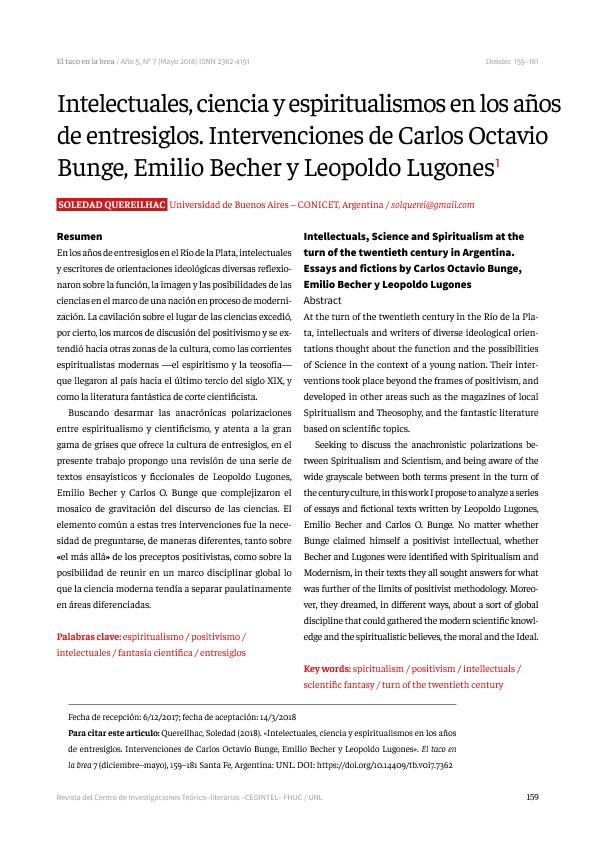Artículo
En los años de entresiglos en el Río de la Plata, intelectuales y escritores de orientaciones ideológicas diversas reflexionaron sobre la función, la imagen y las posibilidades de las ciencias en el marco de una nación en proceso de modernización. La cavilación sobre el lugar de las ciencias excedió, por cierto, los marcos de discusión del positivismo y se extendió hacia otras zonas de la cultura del período, como las corrientes espiritualistas modernas -el espiritismo y la teosofía- que llegaron al país hacia el último tercio del siglo XIX, y como la literatura fantástica de corte cientificista.Buscando desarmar las anacrónicas polarizaciones entre espiritualismo y cientificismo, y atenta a la gran gama de grises que ofrece la cultura de entresiglos, en el presente trabajo propongo una revisión de una serie de textos ensayísticos y ficcionales de Leopoldo Lugones, Emilio Becher y Carlos O. Bunge que complejizaron el mosaico de gravitación del discurso de las ciencias. El elemento común a estas tres intervenciones fue la necesidad de preguntarse, de maneras diferentes, tanto sobre ?el más allá? de los preceptos positivistas, como sobre la posibilidad de reunir en un marco disciplinar global lo que la ciencia moderna tendía a separar paulatinamente en áreas diferenciadas. https://doi.org/10.14409/tb.v0i7.7362 At the turn of the twentieth century in the Río de la Plata, intellectuals and writers of diverse ideological orientations thought about the function and the possibilities of Science in the context of a young nation. Their interventions took place beyond the frames of positivism, and developed in other areas such as the magazines of local Spiritualism and Theosophy, and the fantastic literature based on scientific topics. Seeking to discuss the anachronistic polarizations between Spiritualism and Scientism, and being aware of the wide grayscale between both terms present in the turn of the century culture, in this work I propose to analyze a series of essays and fictional texts written by Leopoldo Lugones, Emilio Becher and Carlos O. Bunge. No matter whether Bunge claimed himself a positivist intellectual, whether Becher and Lugones were identified with Spiritualism and Modernism, in their texts they all sought answers for what was further of the limits of positivist methodology. Moreover, they dreamed, in different ways, about a sort of global discipline that could gathered the modern scientific knowledge and the spiritualistic believes, the moral and the Ideal.
Intelectuales, ciencia y espiritualismos en los años de entresiglos: Intervenciones de Carlos Octavio Bunge, Emilio Becher y Leopoldo Lugones
Título:
Intellectuals, Science and Spiritualism at the turn of the twentieth century in Argentina:
Essays and fictions by Carlos Octavio Bunge, Emilio Becher y Leopoldo Lugones
Fecha de publicación:
06/2018
Editorial:
Universidad Nacional del Litoral. Facultad de Humanidades y Ciencias. Centro de Investigaciones Teórico-literarias
Revista:
El Taco en la Brea
ISSN:
2362-4191
Idioma:
Español
Tipo de recurso:
Artículo publicado
Clasificación temática:
Resumen
Palabras clave:
ESPIRITUALISMO
,
INTELECTUALES
,
POSITIVISMO
,
ENTRESIGLOS
Archivos asociados
Licencia
Identificadores
Colecciones
Articulos(INSTITUTO "DR. E.RAVIGNANI")
Articulos de INST. DE HISTORIA ARGENTINA Y AMERICANA "DR. EMILIO RAVIGNANI"
Articulos de INST. DE HISTORIA ARGENTINA Y AMERICANA "DR. EMILIO RAVIGNANI"
Citación
Quereilhac, Soledad; Intelectuales, ciencia y espiritualismos en los años de entresiglos: Intervenciones de Carlos Octavio Bunge, Emilio Becher y Leopoldo Lugones; Universidad Nacional del Litoral. Facultad de Humanidades y Ciencias. Centro de Investigaciones Teórico-literarias ; El Taco en la Brea; 7; 6-2018; 159-181
Compartir
Altmétricas




